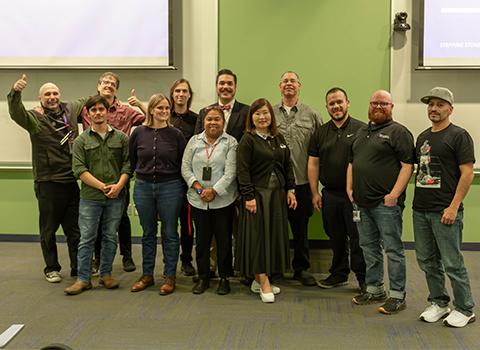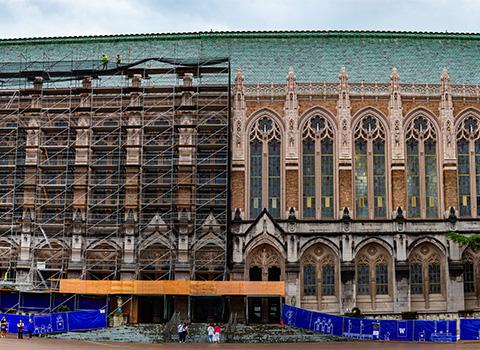MiniMax Expansion

With the collective support of University of Washington’s campus community, UW will take another step towards achieving its sustainability goal of 70% waste diversion by 2020 through the expansion of MiniMax, UW’s comprehensive waste diversion program. By supporting the growth of the MiniMax program, UW will continue to uphold its reputation as a national leader of sustainability.
Currently, 64% of academic and facilities buildings (or 103 out of 161) are already using MiniMax on campus in Seattle. In October 2017, Finance & Administration Executive Vice President, Jeff Scott, delivered the announcement that MiniMax will be implemented in the remaining 36% of UW academic and facilities buildings by the end of 2018. Additionally, all campus buildings at University of Washington Bothell are expected to be “rolled out by this winter quarter, which is 100% of the UW Bothell buildings we maintain,” said UW Bothell Sustainability Coordinator, Cassie Lubenow. Leased and/or off-campus buildings will not be included for either location.
UW Recycling first piloted the use of desk-side and public area bins in the UW Tower in 2008. The program started out simply as a model of sustainability to raise awareness about personal waste generation, but has quickly evolved into a campuswide waste diversion program that helps standardize recycling and composting infrastructure across campus, including restroom paper towel composting. Since the pilot’s launch nine years ago, nearly 300 academic departments and more than 11,000 workstations on campus have adopted the program.
Strategy & Benefits
Strategy & Benefits
UW Recycling will work closely with each building coordinator to plan over 50 installations throughout 2018. When a building adopts the MiniMax system, the entire building’s waste infrastructure is reviewed and bins are moved, removed or added to allow for best coverage.
The goal is to ensure that adequate recycling, compost and garbage containers are provided in common areas so students, faculty and staff can make proper waste diversion choices. This is extremely important because 95% of consumer waste at UW is recyclable or compostable.
"UW continues to lead waste diversion in our region,” said UW Sustainability Director, Claudia Frere-Anderson. “UW Recycling's programs have significantly reduced waste—that would otherwise go to landfill—by 64% in the last fiscal year. The additional impact of MiniMax is the awareness it will provide about taking personal responsibility for our consumption. This shift is key to helping the University achieve its Climate Action Plan goals,” said Frere-Anderson.
School of Social Work Program Coordinator, Leanne Do, agrees. “The shift to a self-service model provides opportunities for users to acknowledge and observe how much waste they generate. The creative compromise between users emptying their own desk-side bins in exchange for serviced compost collection containers throughout the building is such a great example of individual efforts producing a collective good,” said Do.
Meany Center Fiscal Specialist and Green Team Coordinator, James Fesalbon, offered insight in how a sense of personal responsibility developed for him. “When I worked for Genome Sciences in the Foege Building, they already implemented MiniMax. When I moved to Meany Center, MiniMax was not yet installed, so I felt uncomfortable going from wide-availability to minimal-availability of common bins.” (Meany Center has since implemented MiniMax in January 2017.)
An understandable concern for some buildings is apprehension about what the conversion will be like. Over the course of installing the program throughout campus in Seattle, UW Recycling has received direct feedback from UW staff, including Molecular Engineering & Sciences Building Coordinator, Christopher Adams. “The changeover was so fast and unobtrusive, and the conversation so immediately thorough, that it just doesn’t make sense not to get on board!” said Adams. UW Recycling addresses other potential concerns through a list of frequently asked questions.

Bin and dispenser labels for paper towel composting (left). UW Recycling staff review building plan during a MiniMax installation.
Results
Results
Continuing implementation of the MiniMax program “will dramatically benefit UW's waste diversion efforts, advance our sustainability goals and save operational costs,” said UW Sustainability Associate Vice President and Finance & Administration Chief of Staff, Barbara Wingerson. The program contributes to UW Recycling saving the University over $1.8 million in annual disposal costs since it costs twice as much to dispose waste in a landfill than to compost and recycle it. From an environmental perspective, the material diverted from the landfill in 2016 reduced the pollution equivalent of taking 1,900 cars off the road for a full year.
An additional advantage of the self-service model pertains to ergonomic health. By taking a few moments to stand and empty your desk-side bin, you’re actually improving your overall well-being by observing proper ergonomics guidelines, as noted in a recent study highlighted by The New York Times.
The same health benefit applies to custodians. “Decreasing the number of doors needing to be unlocked and bending and stooping to check what little trash there may be would significantly decrease the unnecessary wear and tear on custodians’ bones, joints and ligaments,” said Harborview Medical Center Occupational & Environmental Medicine Clinic Director, UW Center of Occupational Health & Education Director, and UW Environmental Health & Safety Consultant, Dr. Debra Milek.
Finally, MiniMax increases the per-day essential cleaning hours for each custodian staff member. “MiniMax promotes waste minimization while freeing up custodians’ time to focus resources on clean work spaces," said Wingerson. Building Services Department Director, Gene Woodard, points out that there are “thousands of offices on campus, so the added time allows custodians to clean for the health of the University by focusing on restrooms and surfaces in high-traffic areas on a daily basis.”

Desk-side MiniMax bins are based on a self-service model. Building occupants are responsible for emptying their landfill, recyclable and compostable materials.



